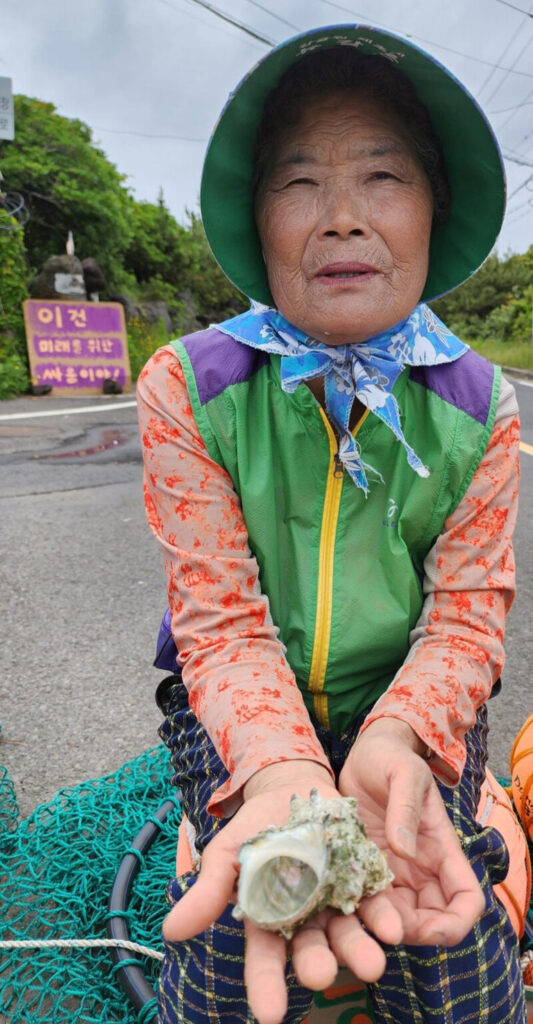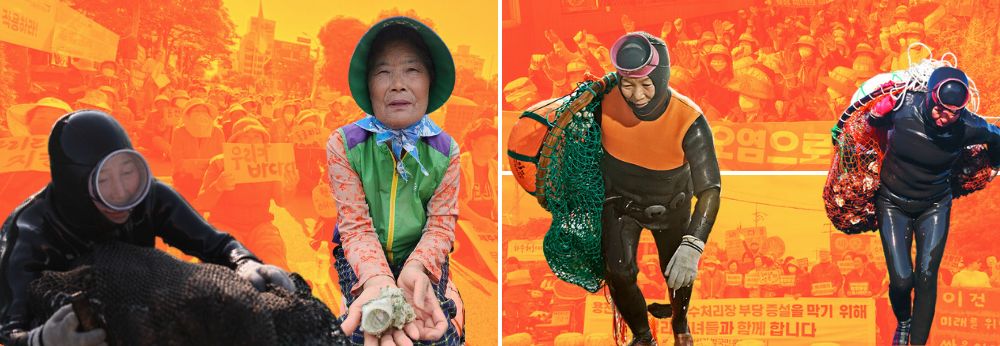La Via Campesina extends its solidarity to the Haenyeo, the sea divers, in the Jeju province of South Korea, where their harvesting of a variety of mollusks, seaweed, and other sea life is being threatened by a sewage treatment plant. The struggle of the Jeju Haenyeo began in 2017 when Jeju Island began construction to double the capacity of the Dongbu Sewage Treatment Plant in Woljeong-ri from 12,000 tons per day to 24,000 tons per day, to accommodate the growing demands of the commercial tourist industry.
Despite strong opposition from local communities and several women’s groups, including the Korean Women Peasants’ Association, the construction work has recently gained significant pace. The local communities have been guarding the site for 19 months to prevent the construction work, but the Jeju provincial administration persists with the expansion.
Haenyeo, meaning “sea women” in Korean, are the women divers of Jeju who have spent decades free diving in the ocean multiple times a day. The ocean is not merely an ocean for them; it is their livelihood and lifelong home. Cutting into the ocean is akin to cutting into their own bodies.
The livelihoods of the Haenyeo have been greatly jeopardized by the impacts of global warming and climate change. Rising temperatures have led to warmer waters, attracting new subtropical species that have displaced the traditional catch of the Haenyeo. Additionally, it has altered the sea floor habitat by introducing more stony coral while decimating seaweed forests. Extensive beds of seaweed have disappeared, replaced by coralline algae with a rock-like appearance, resulting in a decline in marine resources.
Moreover, the Japanese government’s decision in 2021 to release wastewater from the Fukushima nuclear power plant into the Pacific Ocean has caused significant concerns in South Korea. Subsequent protests erupted in the Jeju province as communities feared the potential contamination of the sea by radioactive water. Apprehension and worry regarding the polluted water have already led to a decrease in the consumption of Jeju seafood.

The construction of the sewage treatment plant will exacerbate the crises for both the local population and marine life. According to testimonies from local diver women, the hard stones in the sea where conch and sea urchins live are now all decayed and crumbly, and there are also conch shells that are turned upside down or even rotten. The bottom of the sea, which used to be green and red, has turned gray as if lime powder had been sprinkled on it. Conch, abalone, obunjagi, agar-agar, octopus, and other marine life that were frequently caught in the waters of Woljeong-ri, as well as seaweed including Ecklonia cava (abalone’s food), have disappeared. While neighboring villages like Kimnyeong-ri and Haengwon-ri still have abundant conch, sea urchin, sea cucumber, and agar-agar, these species do not come from Woljeong-ri, likely due to pollution caused by the sewage treatment plant.
The Dongbu Sewage Treatment Plant in Woljeong-ri, which began construction in 1997, started operating in 2007 with a daily throughput of 6,000 tons. In 2014, the capacity was increased (first expansion) to 12,000 tons per day. Due to the continuous influx of population and the increase in tourists, Jeju Island announced plans in 2017 to increase the capacity to 24,000 tons per day.
Haenyeo and civic groups are also concerned about the damage to Yongcheon Cave due to the expansion of the sewage treatment plant. Yongcheon Cave is a unique lava cave with a large-scale cave lake 800m in length and various carbonate formations such as stalactites and cave corals. The cave is a World Heritage Site and the Cultural Heritage Administration alerts that the lower part of Yongcheon Cave, discovered in 2005, is about 200 meters east of the Dongbu Sewage Treatment Plant.
La Via Campesina is alarmed by this utter disregard for coastal communities, marine life, and heritage. We stand firmly with the local communities in demanding an end to this construction that threatens lives and livelihoods.
Stop polluting the sea in the name of expanding the sewage treatment plant!
Don’t destroy the lives of the Haenyeo!
Protect Yongcheon Cave, a World Heritage Site!
We oppose any development that harms the sea and its diverse life forms. We condemn the Jeju Provincial Government for persisting with the expansion against the will of the people. Marine life should be protected not only for its own sake but also for the benefit of all. The ocean, teeming with life, is what sustains us.
The struggle of the Jeju Haenyeo to defend the sea is also our struggle. As La Via Campesina and as a collective, we express our strongest solidarity and support for their fight.
Globalize the Struggle, Globalize Hope!
Faced with Global Crises, We Build Food Sovereignty to Ensure a Future for Humanity!

